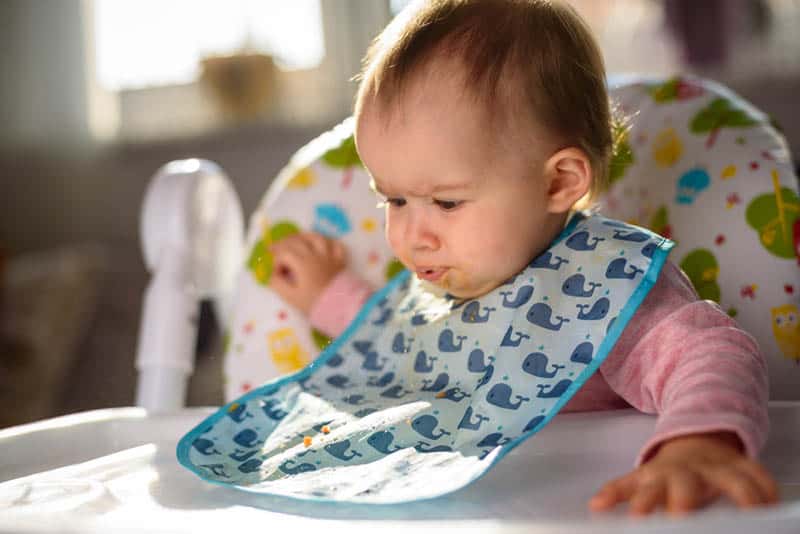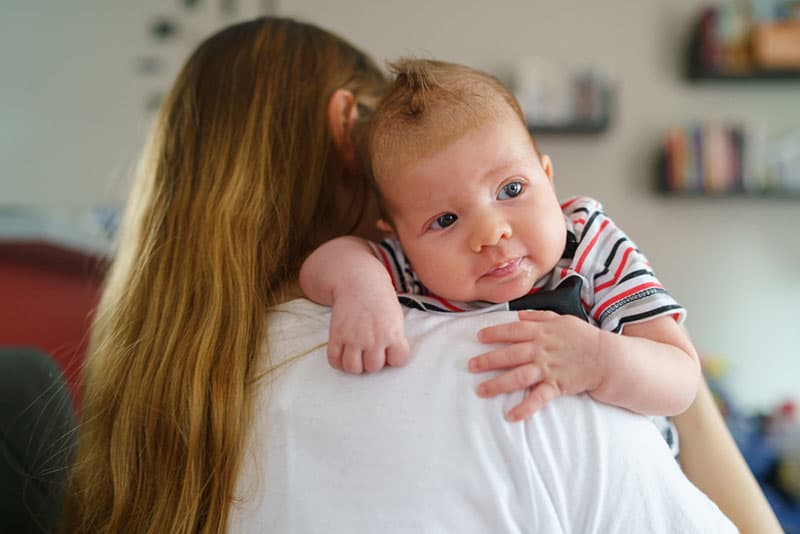Spit-ups are one of the main concerns for every new parent during the child’s first year of life, especially if it happens when the baby is lying down.
There are a variety of possible reasons why your baby spits up when laid down, including infant reflux and overfeeding.
The spit-up is nothing more than a regurgitation of formula or breast milk caused by an immature digestive system.
The digestive system of young babies develops just enough during the 9 months of pregnancy for the little one to function in the outside world.
However, the body continues to develop even after the baby is born, which is why it requires different kinds of nutrients and energy.
Spitting up is a normal process during the period of infancy that doesn’t leave any serious health consequences.
Spit-ups are usually not treated as a medical condition unless it’s accompanied by sudden weight loss.
Slow weight gain isn’t necessarily cause for concern, but it’s always better to ask for professional advice if you’re worried.
6 Reasons Your Baby Spits Up When Laid Down
1. Gastroesophageal reflux (GER)

GER is also known as “infant reflux” or “acid reflux”, which essentially means that the baby is “returning” food from the stomach, as reflux means “flowing back”.
It happens to most babies and isn’t actually a big issue or cause for concern, especially if the baby is eating regularly and gaining weight.
It’s natural for new parents to feel worried about everything and it certainly isn’t easy to see a little baby spitting up the food he just ate.
Although the name of this condition sounds serious, it doesn’t have any lasting consequences on your little one’s health.
GER usually happens because of an immature digestive tract.
The digestive system matures as the baby grows, which means there will be fewer regurgitations until they completely stop (somewhere around 8 months of age).
After feedings, the breast milk (or formula) travels through the throat and esophagus until it lands in the stomach.
But in the case of infant reflux, the food doesn’t stay in the stomach and is regurgitated instead.
The esophagus (the muscular tube that takes food from mouth to stomach) uses the esophageal sphincter to connect to the stomach.
The esophageal sphincter is a muscle ring that allows the food into the stomach.
Its function is to open so the food can go into the stomach and then instantly close back up.
However, because the baby’s digestive system is still not advanced enough, the esophageal “trap door” doesn’t work very well and lets the milk flow back to the mouth, which results in the baby spitting up breast milk or formula.
Formula-feeding parents often opt for a special reflux formula in this case but there are plenty of simple solutions if you are breastfeeding as well.
Again, it’s not serious and usually goes away with time but if you notice any of these signs, you should take your baby to the doctor:
• Lack of weight gain
• Refusing milk or food
• Having blood in stool
• Having a severe cough or difficulty breathing
• Spitting out blood
• Spitting up yellow or green liquid
• Vomiting forcefully (projectile vomiting)
These symptoms may be a sign of a more serious condition, such as GERD (gastroesophageal reflux disease), which is a more serious version of infant reflux.
It continues throughout childhood and can cause irritation of the lining of the esophagus.
2. Overfeeding

Overfeeding your baby is another common reason why your baby spits up when laid down.
As parents, we always want only the best for our kids, but sometimes we can make some pretty big mistakes while doing what we think is best.
One of the biggest fears almost every parent experiences is that their baby is hungry or can’t sleep at night because he didn’t eat enough.
It’s difficult to know whether your baby is full, but it’s better to follow general guidelines from the American Academy Of Pediatrics (AAP) or World Health Organization (WHO) than to feed your baby more often and overload his stomach to the point of spitting everything up.
According to the AAP, newborns should be breastfed or formula-fed every two or three hours in a 24-hour cycle.
Of course, as the baby grows, the gap between feedings will become bigger, so at 2 months, your little one will be perfectly fine with being fed every three to four hours.
After that, the feeding time remains pretty much the same, but the baby has a bigger appetite, which means more food.
For example, an 8-month-old baby will drink around 7 to 8 ounces of milk, along with solid foods.
Another important thing to mention is that babies usually spit up excess food from the stomach, not all food, so there’s no need to feed your baby again if he vomits.
3. Eating too quickly before laying down

There’s a difference between overeating and eating too quickly.
Just because the baby eats fast doesn’t mean that he’s eating a lot.
This is easily noticeable to most parents during bottle-feeding, although it happens during breastfeeding as well.
The baby swallows a lot of air during fast feeding, which forms an air bubble that causes spit-ups.
This can happen due to a developmental phase called cluster feeding.
Your little one will ask to eat more often during these phases and if you don’t adjust the feeding schedule to his needs, the baby will eat voraciously and swallow more air.
Cluster feeding is completely normal and doesn’t mean your baby is starving.
If you notice your little one eats too fast, you should probably switch the baby to an upright position rather than feeding him while he lays down.
4. Fast let-down reflex

Another reason why the baby spits up when laid down could be fast let-down.
Although your body is made for feeding your baby, sometimes you have to intervene during breastfeeding to stop the excessive flow of milk and let the baby breathe.
Infants are too small to know when to let go and take a breath, which is why the mother moves the baby to take a break.
However, this break allows the baby to take in air, which usually causes spit-ups.
Lots of breastfeeding moms have the same issue, which is completely natural, although it can cause small issues with the baby’s digestive system.
This is why many breastfeeding moms pump out the excess milk before feeding their little one.
5. Burping

Even though burping after feeding is supposed to prevent the baby from spitting up, that’s not always the case.
Burping the baby helps get all the excess gas out of the baby’s digestive system.
But, if the baby burps quickly, it doesn’t mean that all the air is out.
This is a very common mistake all parents make, laying down the baby instantly after the first burp.
The best way to prevent spit-up is to keep your baby upright even after he burps until he burps again.
6. Allergies or food sensitivity

A baby’s spit-up can also be a sign of an allergy or sensitivity to certain food.
A lot of people find this strange because infants don’t eat solids, but there are many things that are transferred to the baby through breast milk.
This is why mothers should avoid common allergens which might cause stomach pain or allergies.
If the baby spits up often, try avoiding something you ate that day just to check which food causes the problem.
If your baby is formula-fed, there’s a possibility that he’s allergic to cow’s milk formula. In that case, you should contact a pediatrician and check which formula would suit your little one.
Ways To Prevent Baby Spitting Up When Laid Down
1. Don’t let the baby sleep while feeding
Feeding the baby in a lying position is perfectly fine, but it’s not recommended for babies that spit up when laid down.
RELATED: What You Should Do If Your Baby Spits Up In Sleep
It’s important to keep yourself and the baby upright while feeding him to keep the natural flow of milk and reduce the air intake which causes air bubbles.
2. Create a good feeding routine

This step is crucial from the first day of the baby’s life – creating a functional and reasonable feeding routine.
If the baby feeds every two hours, he won’t stay hungry for too long and he’ll take it slow.
That way he won’t overfeed or swallow air, so there’s a smaller chance he’ll spit up the stomach content.
3. Stay relaxed when feeding the baby
New moms are usually a bit overwhelmed with everything during the first year of a baby’s life, and that’s completely normal because they go through great changes physically, emotionally, and spiritually.
However, mothers should also be an active part of the feeding process, meaning that you need to relax and calm yourself before feeding the baby.
Try to avoid any type of distraction that might surprise your little one and increase the chance of swallowing air.
Make sure the baby stays calm as well to avoid crying and fussiness. If the baby cries constantly during feeding, check his diaper and his temperature.
4. Keep the baby in one position after feeding

Don’t put your baby to bed right after feeding – this is probably one of the main rules almost every parent knows.
Burping is an important process after feeding which helps the food settle in the baby’s stomach.
This is why the baby should stay in an upright position for some time.
If the baby spits up when laid down, you need to extend the time before putting him to bed.
However, that’s not the only reason you should keep your baby in one position.
Sudden movements after feeding may have a negative impact on little spitters, so try to keep your baby still while holding him, without shaking or moving him too quickly.
5. Don’t dress your baby too tight
I don’t think any parent does this, at least not intentionally.
Babies should wear loose clothes to bed and this includes diapers as well.
There’s no need to tighten diapers during the night, because it may just put additional pressure on your baby’s stomach and lead to spit-ups.
If the baby spits up when laid down even though you did everything right, try checking how smooth and comfy your baby’s clothes are.
I recommend organic clothes for babies which are super comfortable and loose enough for sleeping.
Final Thoughts

Having a baby is one of the best and most stressful experiences in the life of almost every parent.
I still remember how I checked my baby every hour during the night, which basically meant I didn’t get any sleep.
Although this is understandable behavior, it shouldn’t become a habit, because a happy mom means a happy baby, and mom can’t be happy if she doesn’t get rest.
When it comes to spitting up, one of the main concerns of almost every parent is sudden infant death syndrome (SIDS) and whether it can happen to a baby who spits up when laid down in a bassinet or crib.
However, the chances of choking from spit-up are very small because he’ll instantly start to cough or swallow all the fluids in his mouth.
If your baby has enough wet diapers and isn’t losing weight, you have a “happy spitter”, so all you have to do is wait until your little one’s digestive system is mature enough to keep the food inside the stomach.
I hope this article has helped you to better understand why the baby spits up when laid down and how to prevent it.
But please don’t hesitate to reach out to your pediatrician for expert advice.
Just remember mamma, you’ve got this!
References:
• Jain, Sanjeev. (2020, October 29). “How Often and How Much Should Your Baby Eat?”. AAP website.
Like this post? Please share or pin it for later. You can also stay in the loop and follow us on Facebook, Instagram or Pinterest.

We love honesty! Find Your Mom Tribe is an Amazon Associate and we earn from qualifying purchases through affiliate links at no extra cost to you. Please see our full Amazon Affiliate disclosure for more information.

